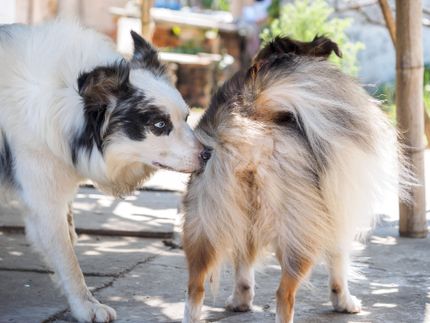Boxapoint:Boxer and German Shorthaired Pointer Mix
Facts & Origin
Boxer and German Shorthair Pointer - a hybrid breed.
The Boxer and German Shorthair are a great hybrid breed that can be a very special companion for many people. Especially if you are looking for a dog that is intelligent and lively, you should definitely consider a Boxer and German Shorthair. This breed is very adaptable and loving. It is playful and has a calm nature. In addition, the mixed breed is a great choice for families with children. These dogs need a lot of exercise and love to play, which means they will spend a lot of time outside. With the right training and lots of love, this breed can be an unforgettable companion for life.
| Alternate Name | - |
| Origin | Germany |
| Life expectancy | 10 - 15 years |
| Care requirements | low-maintenance |
| Activity level | average to high |
| FCI group | not recognised |
| AKC group | not recognised |
| KC group | not recognised |
More Boxer mixes
More German Shorthaired Pointer mixes
Attitude, character and temperament of the breed
Possible character traits of Boxer and German Shorthair Mix - Such is probably his nature.
The Boxer- German Shorthair Mix is a very popular dog breed and a great four-legged companion. This fairly new breed is extremely intelligent and energetic and their character makes them an ideal family dog. They are lively, bright and playful, but also very loyal and affectionate. Their spirited nature makes them an ideal dog for activities such as jogging, swimming or walking. The Boxer-German Shorthair mix has a strong need for activity and interaction, which makes them an especially appealing four-legged friend for active people.
This breed usually has a very friendly nature, which makes them a lovely companion. They are usually very good-natured when interacting with people and animals, but are also very alert, curious and listen well to commands. In addition, these dogs are very adaptable and can handle a variety of different lifestyles.
Keeping a Boxer-German Shorthair mix is not too difficult. They need to get regular exercise and a lot of attention and love to meet their physical and mental needs and feel comfortable. In addition, they need to receive a fair amount of training to increase their discipline and learn how to respond to commands. It is also important that they have regular vet visits and vaccinations to protect them from disease.
To create a harmonious partnership with a Boxer-German Shorthair mix, it is important to teach them consistency and consistency while addressing any behavioral issues. By giving them regular training, a varied diet, and lots of love, you can help them be a content, beloved four-legged companion.
Character
Usage


Health and breeding information
What diseases can occur in Boxer and German Shorthair mix.
There are many different types of health problems that are common in Boxer German Shorthair mixes. These mixed breeds are a popular choice for families looking for an energetic, loyal and intelligent pet. However, they are also prone to some specific hereditary diseases.
One of the most common inherited diseases is Erb-lipodystrophy complex (ELDC), a genetic problem caused by a violation of fat metabolism in the body. With ELDC, dogs can develop muscular weakness, lameness, unintended weight loss, seizures, fatigue and loss of appetite. If these symptoms are caught early enough, the disease can be treated.
Another common condition in Boxer German Shorthaired Pointer mixes is elbow dysplasia, which is caused by painful joint damage. In severe cases, the dysplasia can lead to joint instability and degenerative bone disease. Fortunately, diagnostic tests are now available to detect and treat possible elbow dysplasia early.
Another common condition in Boxer German Shorthair mixes is epilepsy, a neurological condition that causes seizures. These seizures usually block the dog's brain, causing tremors or falling. If a dog has a persistent seizure, a veterinarian must be seen immediately.
Other medical conditions affecting Boxer German Shorthair mixes include cardiovascular disease, respiratory problems, skin disease and other chronic conditions. In addition to genetic conditions inherent in the dog's bloodlines, some dogs can also be affected by environmental stressors, nutritional problems, and other health issues.
Since Boxer German Shorthair mixes are prone to some serious genetic diseases, it is important that potential owners* check the reputation of the breeders before purchasing such a dog. It is also advisable to have regular veterinary examinations to detect possible diseases as early as possible. Giving the dog a balanced diet and exercising it can also help maintain its overall health.
What does this mongrel look like?
The Boxer and German Shorthair mixed breed dog has versatile coat and color combinations. The coat is usually short, silky and close lying. It varies from light to medium brown, with white patches or markings on the chest and paws. Some dogs have a red coat or light colorations ranging from pale gray to black. The eyes are usually dark brown, but sometimes the dog has blue or green eyes. The head is a little longer than other dog breeds, which gives it an interesting expression. It also has long ears that extend over the wide forehead.
What are breed characteristics of this mix dog?
A Boxer and German Shorthair mix usually grows between 42 cm and 57 cm tall and weighs between 22 kg and 30 kg. He has an athletic and muscular build. His legs are long and strong. The head is medium sized and the face has a strong nose. Often the eyes are large, dark and lively. The body appears muscular and has a broad chest. The ribs are well defined and the back is straight.The tail is typically long and straight. The coat cut is usually short, thick and smooth. The color tone of the coat can vary from light brown to reddish to black.
| Fur length | short |
| Fur | flat coated |
| Ear shape | Floppy Ear |
| Tail | lang - short |
| Anatomy | square, hefty, sporty |
| Size ♀ | 53 - 60 cm |
| Weight ♀ | 20 - 29 kg |
| Size ♂ | 57 - 65 cm |
| Weight ♂ | 25 - 32 kg |
| Suitable For | - |
Known Diseases
Epilepsy
Definition: Dog has epilepsy if, for example, at least two epileptic seizures occur more than 24 hours apart.
Cardiomyopathy
In large breeds of dogs, dilated cardiomyopathy (DCM) is by far the most common cardiomyopathy.
Kidney disease
Symptoms of kidney disease in dogs: increased urination (polyuria) increased water intake. Inflammation of the mucous membrane of the mouth. Loss of appetite
Wobbler syndrome
In veterinary medicine, this is the name given to a complex of symptoms caused by nerve damage in the area of the spinal cord or spinal cord nerves in the area of the cervical spine.
FAQ
-
A Boxer and German Shorthair Mongrel usually has a robust appearance, medium length ears, a short coat and a strong, athletic build.
-
The adult usually reaches a size of 45 to 70 cm and a weight of 25 to 45 kg.
-
Boxers are adaptable, lovable, playful and active. German Shorthairs are active, intelligent, loyal and love to hunt. The combination of these two breeds results in a friendly, active and intelligent dog that is easy to train thanks to its hunting instinct.
-
Since this is an active breed, it is important to make sure the dog has plenty of exercise and daily training sessions. Positive reinforcement is also important to get the dog to progress and learn new tricks.
-
This breed is prone to some health problems that are present with both breeds, including heart disease, respiratory problems, skin problems and eye disease. It is important to make regular veterinary visits to identify and treat potential problems early.
Useful Articles
You can find articles that might interest you in the dogbible blog to match your favorite breed.
Visit our magazineto stay up to date on dog trends.
To find out more, view our Privacy Policy
Find here the breed that suits you and find out what character traits it has. Here you can also learn more about the origin, size and weight of your favorite breeds.
Matching your favorite breed, you'll find articles that might interest you on the dogbible dog blog.
Allergy dog: Hypoallergenic breeds really exist?
Respiratory diseases in dogs - bronchitis and co recognize and combat
Eye discharge (epiphora) in dogs - causes, control
Annual check-up at the vet: you and your dog should be prepared for this
Dog beach Balaton: These dog places at the Balaton you should know
















